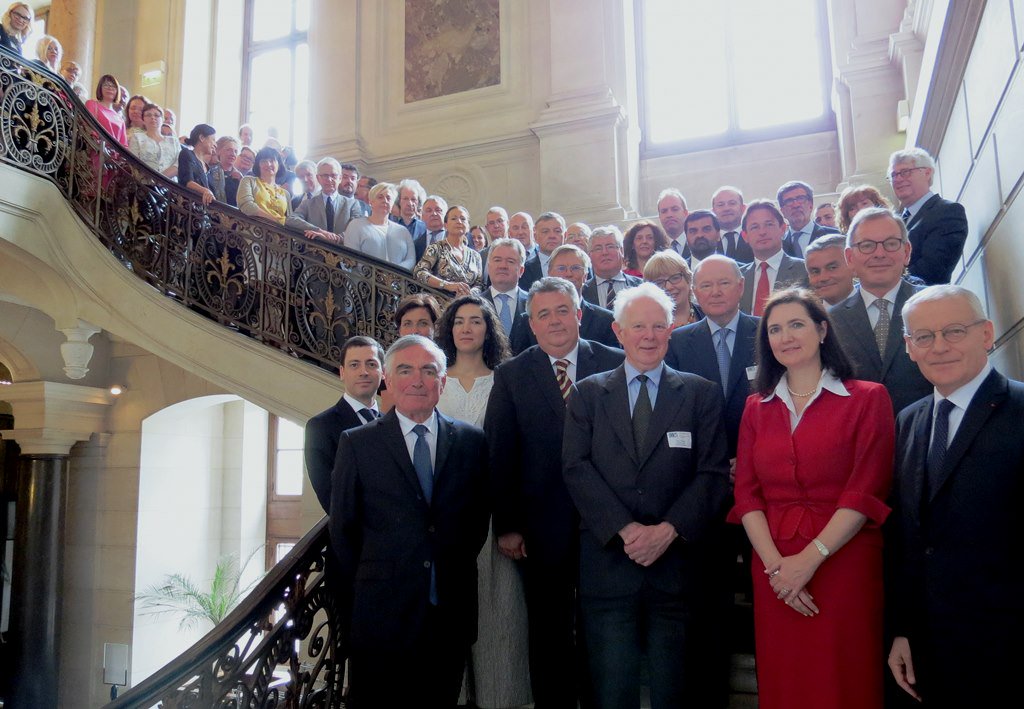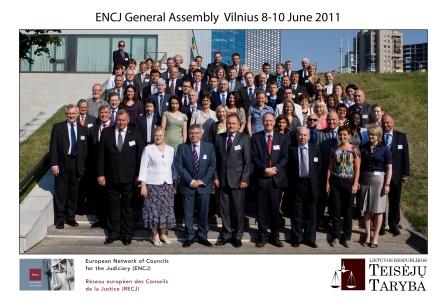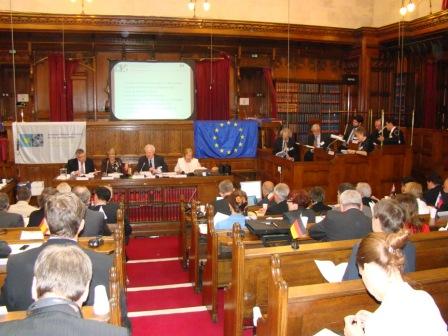The General Assembly is composed of the members of the Network. It meets at least once per calendar year and is convened and presided by the President. The General Assembly is endowed with all the powers necessary to achieve the aims and objectives of the Association.
The General Assembly has the following powers:
- To elect of the President and the Executive Board
- To determine the policy and activities of the ENCJ
- To set up commissions and working groups, their membership and duration
- To amend the Statutes
The President, the Executive Board, the committees and ad hoc working groups report to the General Assembly.

2022 - The General Assembly was hosted by the Supreme Judicial Council for Administrative Justice of Greece in Athens, from 1-3 June. The general theme was: "judicial solidarity in times of crisis". The Athens Declaration on judicial solidarity was adopted which states that 'Judiciaries should support any judiciary which is under attack and do all they can to persuade the executive and legislature to support the action which they are taking in this regard. The prudent convention that judges should generally remain silent on matters of political controversy should not apply when the integrity and independence of the judiciary is threatened'.
At the ENCJ General Assembly in Athens on 3 June 2022, five Members and Observers presented their best idea which has been successful and has led to positive change.
Raad voor de rechtspraak Netherlands won the 2022 ENCJ Award for Positive Change with their ‘Firefighters Brigade’. The firefighters brigade assists courts with backlogs. Thanks to the brigade, the processing of cases can be accelerated.
During its meeting in Athens on 1 June the ENCJ General Assembly decided to renew the mandate of Filippo Donati as President till 30 November 2022. The General Assembly also elected Dalia Vasarienė to succeed Filippo Donati as of 1 December 2022. (mandate December 2022- June 2024).
In addition, four new Board members were elected: Conseil Superieur de la Justice / Hoge Raad voor de Justitie Belgium, Sudna Rada Slovakia and Raad voor de rechtspraak of the Netherlands (re-election) and Sodni Svet of Slovenia (re-election).
They will join the remaining members of the Board (SJC AJ Greece, TT Lithuania and CSM Romania). Once Dalia Vasariene succeeds Filippo Donati the CSM of Italy will take the place in the Board of TT Lithuania -mandate December 2022 - June 2024).
The French and Portuguese CSM ended their mandate as Board members.

2021 -On 28&29 October 2021 the ENCJ held an Extraordinary General Assembly in Vilnius. The General Assembly was titled "reconnect, rekindle, reunite". The General Assembly discussed the need for a code of conduct for the Councils, topics to be addressed in dialogue groups and in lunch seminars. Sadly the General Assembly also decided to expel the KRS (National Council for the Judiciary) of Poland from the Association. The ENCJ compendium on Councils for the Judiciary was also adopted.
2020 & 2021 - Due to the Covid-19 Pandemic online General Assemblies were organised in June 2020 and June 2021. The General Assemblies dealt with administrative issues such as the accounts, budget and the election of Board members.
2019 - The General Assembly was hosted by the High Judicial Council of Slovakia in Bratislava, from 5 June - 7 June. The general theme was: « The Future of the Rule of Law and Justice in Europe ».
The Bratislava Manifesto, which aims to deliver a clear message for the new European Institutions (European Commission and European Parliament), was adopted. In this Manifesto, the ENCJ makes the following points:
- The ENCJ calls for a European dialogue between the state powers as a means to achieve effective protection against intervention by other branches of state. The ENCJ stands ready to play its part in that dialogue.
- The ENCJ calls for a formalised consultation status within the European Union for national Judiciaries through the ENCJ and other relevant EU level judicial networks.
- The ENCJ urges the European Institutions to endorse the central role the judiciaries and judicial networks play in promoting and protecting the Rule of Law and formalise their role in any future Rule of Law evaluation mechanism.
- The ENCJ calls upon the European Institutions, in particular the European Commission, to encourage further investments by the Member States in their judiciaries and to ensure that Member States involve judiciaries in relation to reform or modernization plans.
- The ENCJ believes that relevant information on national judicial systems such as any European Commission synthesis of the information gathered in the preparation of the EU Justice Scoreboard, the European Semester, the information collected and the standards developed by the Council of Europe, the ENCJ and other EU judicial networks should be promoted through e.g. raising public awareness, and be made available in a centralised and easily accessible place.
At the second organized ENCJ market eight Members of the ENCJ presented their best idea which has been successful and has led to positive change. A wide variety of ideas were presented in a traditional market setting. The Judicial Council of Lithuania won the ENCJ Award for Positive Change with their « Knowledge is Power" programme. The HRJ/CSJ Belgium, with their programme « Flavour », about simple language in the Judiciary, and CGPJ Spain, with the « Risk Prevention Plan », were two very close runners up.
The Domstolsstyrelsen of Denmark, the Országos Bírói Tanács of Hungary, and the Courts’ Service of Ireland were elected into the Board for two years. The Councils for the Judiciary of Croatia, Portugal and England and Wales, ended their mandate as Board member.
2018 - The General Assembly was hosted by the CSM of Portugal in Lisbon, from 30 May - 1 June. The general theme was: "leading positive change". The Lisbon Declaration was adopted which states that Councils for the Judiciary should initiate and lead a process of positive change. It focuses on two aspects: the internal aspect in the sense of the engagement of stakeholders and in t he external sense of the judiciary's relationship with other state posers and strengthening the role of the judiciary within the State. The Declaration also contains paragraphs that deal with the situation in Poland and Turkey.
At the first ever organized ENCJ market nine Members and Observers of the ENCJ presented their best idea which has been successful and has led to positive change. A wide variety of ideas were presented in a traditional market setting. The Judicial Council of Lithuania won the ENCJ Award for Positive Change with their #courtscare programme. The Supreme Judicial Council of Bulgaria was a very close runner-up with their programme called Open Courts and Prosecutor’s Offices.
Mr. Kees Sterk, member of the Netherlands Council for the Judiciary, was elected to succeed Ms Nuria Díaz Abad as President of the ENCJ. His mandate started on 1 June 2018 and last two years. The Hoge Raad voor de Justitie (HRJ/CSJ) of Belgium, the Consiglio Superiore della Magistratura (CSM) of Italy, the Judicial Council of Lithuania (TT) and the Consejo General del Poder Judicial of Spain were elected into the Board for two years. The Dutch, Romanian, Scottish and Slovenian Councils for the Judiciary ended their mandate as Board member.

2017 - The General Assembly was held in Paris from 7 to 9 June in the Cour de Cassation. The central theme of resilient justice was discussed and the Paris declaration was adopted. In it the ENCJ calls upon the European Institutions and Member States to guarantee judicial independence in accordance with the Rule of Law, and, furthermore, calls upon Councils for the Judiciary and Judges at all times to be resilient in the face of the challenges which face them. A number of speeches were also given:

- Ms Nuria Díaz Abad
- Mr Bertrand Louvel
- Mr Jean-Claude Marin
- Lord John Thomas
- Ms Maria Péral
- Mr Sherlo Esajas
2016 - The General Assembly was held in Warsaw from 1-3 June and hosted by the Krajowa Rada Sądownictwa. The general theme was the future of justice in Europe. The Warsaw declaration was adopted in which the ENCJ amongst others recognises that the administration of Europe’s justice systems in the 21st century will change radically as a result of the use of information and communication technology. It looks forward to the use of online dispute resolution and other technologies to deliver justice more effectively and quickly and at lower cost to all European citizens. It will still be essential for the ENCJ and its members and observers to maintain and strengthen the independence and accountability of judiciary for the benefit of European citizens in order to ensure that they have effective access to justice.
In relation to the developing situation in Poland, the ENCJ emphasises the importance of the executive respecting the independence of the judiciary, and only undertaking reforms to the justice system after meaningful consultation with the Council for the Judiciary and the judges themselves.
The General Assembly also welcomed two new Members; the Greek Supreme Judicial Council of the Civil and Penal Justice and the Greek Supreme Judicial Council of the Administrative Justice, and elected Nuria Díaz Abad as the new President for a mandate of two years.
2015 The General Assembly met in The Hague and was hosted by the Dutch Raad voor de rechtspraak. The general themes was "promoting effective justice systems". Ms Vera Jourova gave a keynote speech as well as Ms Eleanor Sharston, Advocate-General in the Court of Justice of the EU.
The Hague Declaration was adopted which states that:-
1. Independent and accountable judiciaries are an essential component of high quality, effective and efficient justice systems, and a prerequisite for a well-functioning EU area of justice;
2. The ENCJ will facilitate the use of dialogue groups and other means to enable its members and observers to enhance the quality, efficiency and effectiveness of justice in their countries for the benefit of all persons;
3. The ENCJ will continue to develop and improve its standards, guidelines and statements of best practice and find ways to ensure that its members and observers more closely comply with them in order to improve their justice systems; and
4. The ENCJ will endeavour to identify elements that constitute a quality justice system and subsequently develop indicators that will assist in the evaluation of the measurement of the quality of justice with a view to its enhancement across the EU and in candidate member states.
2014 - From 11-13 June 2014 the General Assembly met in Rome to celebrate its 10th anniversary. The 10th anniversary celebrations kicked-off with a reception at the Quirinale Palace hosted by the President of the Republic of Italy, Mr Napolitano, who is also the President of the Consiglio Superiore della Magistratura. All former Presidents of the ENCJ were also present and addressed the General Assembly.
The ENCJ Rome declaration was adopted. The Declaration states that in its first 10 years, the ENCJ has achieved its principal objective of improving cooperation and mutual confidence between the Councils for the Judiciary and the judiciaries of EU member states and candidate member states. The ENCJ plays a crucial role in the maintenance of judicial independence, which is as much a central protection for the rights of citizens of Europe in 2014 as it was in 2004. Looking to the future, the ENCJ will continue to strive the improvement of timely and effective delivery of independent and high quality justice for the benefit of all the citizens of Europe by upholding the importance of independent Councils for the Judiciary, cooperating with the European Commission specifically in relation to the Justice Scoreboard and improving the independence and accountability of the judiciary across Europe.
2013 - From 5-7 June 2013 the General Assembly met in Sofia, Bulgaria. The general theme of the meeting was "Independence and Accountability of the Justice System. A number of interesting presentation on this topic were made by i.a. Emmanuel Crabit of the European Commission, by Geoffrey Vos of the Judges Council of England and Wales, Sonia Naidenova of the Supreme Judicial Council of Bulgaria and by Paolo Corder of the Consiglio Superiore della Magistratura of Italy. The Sofia Declaration reiterates the importance of an independent judiciary and the role of Councils for the Judiciary as a safeguard for this independence. An independent EU Rule of Law mechanism is called for which respects the diversity of justice systems and which inter alia will assist in the protection of the independence of the judiciary and in ensuring the promotion of an effective justice system and growth for the benefit of all citizens
2012 - The General Assembly took place in Dublin Castle, Ireland on 9-11 May 2012. The General Assembly adopted the ENCJ Dublin Declaration (EN/FR) by which the Members adopted standards and indicators regarding the recruitment, selection, appointment and promotion of members of the judiciary and the competent body. The ENCJ Members also agreed to aim for compliance with these standards and indicators within their own organisation and to promote these standards actively within the judiciary and towards the other relevant authorities.
Article Irish Times on the ENCJ Dublin declaration
A number of other recommendations were also adopted on the topics of Judicial Reform and the relations of the Judiciary with Society and the Media (summary of all main recommendations adopted by the General Assembly).
2011- The IXth General Assembly was held in Vilnius, Lithuania 8-10 June 2011. The general theme of the meeting was "challenges and opportunities for the Judiciary in the current economic climate". The Vilnius Declaration was adopted which lists a set of recommendations for the judiciaries of Europe on how to respond to the actual challenges and opportunities they are facing.

2010 - In 2010 the General Assembly meeting was helt in London at the Royal Courts of Justice. The London declaration was adopted that approved the ENCJ report "Judicial Ethics - Principles, Values and Qualities" and proposes that ENCJ Members and Observers should actively promote the content of the report.
2009 -The Bucharest declaration on Transparency and Access to Justice was adopted at the General Assembly in Bucharest, Romania
2008 - General Assembly in Budapest. The Budapest declaration on Self-Governance for the Judiciary was adopted.
2007 - Conference report 2007 General Assembly Brussels, Belgium
2006 - Conference report 2006 General Assembly Wroclaw, Poland
2005 - Conference report 2005 General Assembly Barcelona, Spain
2004 - Constituent Assembly Conference report 2004 General Assembly Rome, Italy
2003 - Judiciaries in the EU "Prospects for cooperation" - Conference report, The Hague, NL

The General Assembly in plenary at the Royal Courts of Justice in London, June 2010

